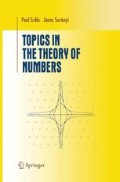Abstract
We have already encountered Diophantine equations in Chapter 1. For example, we investigated in detail first-degree equations with two unknowns (Sections 1.29–1.30), and found a presentation for all Pythagorean triples (Sections 1.21–1.24). In Chapter 4 we studied which positive integers can be represented as the sum of two Squares. We will return to the question in Section 4. We will now consider a collection of similar questions.
Access this chapter
Tax calculation will be finalised at checkout
Purchases are for personal use only
Preview
Unable to display preview. Download preview PDF.
References
See, for example, E. Landau: Vorlesungen über Zahlentheorie, I. S. Hirzel, Leipzig, 1927, pp. 114–125.
For additional reading regarding the number of representations of integers as the sum of two Squares, see, for example, I. Niven, H. S. Zuckerman: An Introduction to the Theory of Numbers, Wiley, New York, 1991. A more general reference treating a broader ränge of questions is E. GROSS WALD: Representations of Integers as Sums of Squares, Springer, New York, 1985.
E. Waring: Meditationes Arithmeticae, Cambridge, 1770, Theor. XLVII.
R. C. Vaughan: Acta Math. 162 (1989), pp. 1–71.
R. Balasubramanian, J-M. Deshuillers, F. Dress: Comptes Rendus, Acad. Sci. Paris; Ser. 1 303 (1986), pp. 85–88 and pp. 161–163.
G. H. Hardy, E. M. Wright: An Introduction to the Theory of Numbers, Oxford (1960), Chapters XX and XXI; T. D. Wooley: Annais of Math. 135 (1992) pp. 131–164.
P. Erdős, K. Mahler: Journal London Math. Soc. 13 (1938), pp. 134–139.
See, for example, J.-M. Deshouillers: Seminar on Number Theory, 1984–1985. Exp. No. 14 47 pp., Univ. Bordeaux I, Talance, 1985; N. D. Elkies: Math. Comp., 51 (1988), pp. 825–835.
G. H. Hardy and E. M. Wright: An Introduction to the Theory of Numbers, Oxford (1960), §§XXI.7-XXI.8
This was noted by I. Z. Ruzsa.
K. Győry: Acta Arithmetica 80 (1997) pp. 285–295.
R. Obláth: Journ. London Math. Soc. 23 (1948), pp. 252–253.
P. Erdős, J.L. Selfridge: Illinois Journ. of Math. 19 (1975), pp. 292–301.
R. Tijdeman: Acta Arith. 29 (1976), pp. 197–209
Author information
Authors and Affiliations
Rights and permissions
Copyright information
© 2003 Springer Science+Business Media New York
About this chapter
Cite this chapter
Erdős, P., Surányi, J. (2003). Diophantine Problems. In: Topics in the Theory of Numbers. Undergraduate Texts in Mathematics. Springer, New York, NY. https://doi.org/10.1007/978-1-4613-0015-1_7
Download citation
DOI: https://doi.org/10.1007/978-1-4613-0015-1_7
Publisher Name: Springer, New York, NY
Print ISBN: 978-1-4612-6545-0
Online ISBN: 978-1-4613-0015-1
eBook Packages: Springer Book Archive

